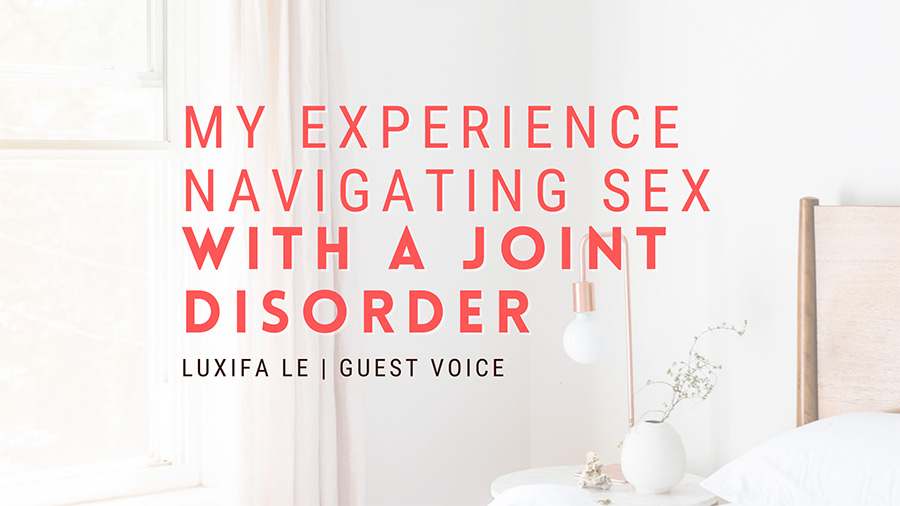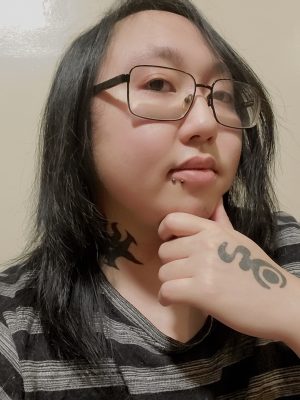
Sex is a topic that we rarely see cross-over with the issue of disability, and that’s a damn shame because the intersection of disability and sexual wellness is an important one to cover. This lack of inclusion of disabled people can come across as infantilizing; it’s as if some people think our disabilities make us too “pure” for sexual contact. People treat the idea of sex with a disabled person as “icky;” they don’t want to think about that! But this leads young disabled people to a rocky road of learning to navigate sexual wellness and its intersection with our lives.
I’m diagnosed with Hypermobility Spectrum Disorder. In short, my joints are loose, and they dislocate partially — sometimes entirely — relatively easily. Sometimes these dislocations are rather painless; sometimes, they hurt like Hell. In particular, one set of joints that hurt quite a bit for me is my hips. When they’re jammed or out of place, I notice immediately. It hurts, and I have to spend time figuring out how to get them back where they came from before I can move effectively.

For many people, even a partial dislocation is a severe affliction that they go to the emergency room for. Conversely, I usually pop my joints back in and take the rest of the day easy, maybe a few days if it was awful. It’s probably easy to see how this might intersect with sexual wellness, but the real problem is that I had to learn how to navigate it by myself. No one taught me how to have sex beside the “regular people” way.
This situation left me feeling more broken and unlovable than usual….What man would love a man who can’t have sex with him properly?
My first few partners were skinny or fit, so even I never really thought about it until began seeing someone who was plus-sized. The complications seemed endless at first. I couldn’t be on top unless I were pitching because my hips would slide out of place. No lap sex whatsoever was possible. Missionary left me immobile for several minutes and forced me to reposition my legs with my arms.
This situation left me feeling more broken and unlovable than usual. I was taught many of the same misogyny-rooted lessons about men and sex growing up. What man would love a man who can’t have sex with him properly? Of course, in the back of my head, I wanted to believe that there was more to love than sex — that I was worth more than my sexual “usefulness” — but the nagging feeling of unworthiness pervaded my sensibilities.
No one ever mentioned disability and sex. It wasn’t included in sexual education at all. In my early twenties, I found myself suddenly relearning how to have sex because I dared to love someone whose body didn’t immediately jive with mine.
Everything I knew about sex had to go out the window and be replaced with new information on the fly. I had to learn how to give myself a break, new positions that were more comfortable, and that it was okay if sex took a lot out of me or if we had to stop in the middle.
No one ever mentioned disability and sex.
It wasn’t included in sexual education at all.
The biggest keys that I found for myself were to stop if it hurt in a wrong way. Massage my hips after the deed was done. Don’t be afraid to move my legs into a comfortable position with my hands. Most of all, I learned to communicate with my partner about these needs. That they hadn’t grievously harmed me, that I just needed a rest before I started moving again. Communicate that I enjoyed it and wanted them.
I’m still not yet there. I still struggle with feeling unwanted or unlovable when I have difficulties surrounding sex. My ex and I still talk and are close, though we’ve ended our romantic relationship. Still, I wonder if my sexual issues made them less likely to want to have sex with me — if it was my fault.
This hush-hush narrative surrounding sex and disabled folks needs to end. Disabled young people need to be separated from the culture of shame that surrounds sex and the culture of infantilism that surrounds disability so that they can practice safe and healthy sex.